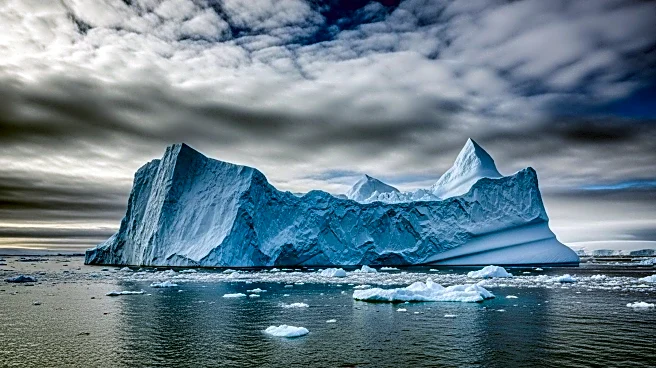What's Happening?
Recent research published in the journal Nature highlights significant and abrupt changes occurring in Antarctica, driven by the loss of sea ice and warming ocean waters. These changes are not isolated but are interconnected, leading to potential global consequences such as rising sea levels. The study, led by climate scientist Nerilie Abram, emphasizes the cascading effects of these changes, which could push Antarctica past a critical threshold, resulting in the flooding of coastal cities worldwide. The loss of sea ice, which has been occurring at an unprecedented rate, is a major factor contributing to these changes, as it affects the stability of ice shelves and ice sheets.
Why It's Important?
The developments in Antarctica have profound implications for global climate and sea levels. As ice shelves and sheets destabilize, they contribute to rising sea levels, which could lead to significant impacts on coastal communities and ecosystems. The loss of sea ice also affects ocean circulation and nutrient distribution, impacting marine life and the broader food web. The study underscores the urgency of addressing greenhouse gas emissions to mitigate these changes and prevent catastrophic outcomes. The potential collapse of the West Antarctic Ice Sheet, for instance, could raise sea levels by over 10 feet, posing a threat to global political and economic stability.
What's Next?
The research calls for immediate and substantial reductions in greenhouse gas emissions to prevent further destabilization of Antarctica's ice systems. Scientists are gathering more data to refine models predicting future changes, emphasizing the need for global cooperation in climate action. The study suggests that every fraction of a degree of warming avoided can reduce the risk of catastrophic sea-level rise, highlighting the importance of international climate agreements and policies aimed at reducing emissions.
Beyond the Headlines
The situation in Antarctica also raises ethical and cultural questions about humanity's responsibility to protect vulnerable ecosystems and communities from climate change. The potential loss of habitats for species like emperor penguins, which rely on stable sea ice for breeding, highlights the broader ecological impacts of these changes. The research serves as a reminder of the interconnectedness of global systems and the need for holistic approaches to climate solutions.












